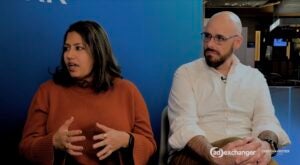Facebook’s Marketing Partner (FMP) program is getting a bit of a facelift with the addition of new badge categories and tools to help with measurement and creative.
Hundreds of tech companies, agencies and consultants jammed into the Hammerstein Ballroom in New York City on Wednesday to get the skinny at Facebook’s sixth global marketing partner summit.
The biggest change focuses on bringing agencies and consultants closer together with Facebook’s more traditional partner ecosystem of tech companies. In the past, Facebook managed these groups separately and they didn’t have much to do with each other.
“We used to be running one playbook over here and another over there, and now we’re unifying the playbooks and thinking about what solutions apply across all partner types,” Patrick Harris, Facebook’s VP of global agency development, told AdExchanger.
Facebook also wants feedback on how to make its platform even more inviting for advertisers.
“We need this ecosystem to serve our advertisers,” said Gene Alston, Facebook’s VP of marketing partnerships. “There’s a diversity of people working on the Facebook platform that you don’t always hear about – the unsung heroes – but they’re deeply experienced on our platform.”
Independent marketing consultants can now get their own FMP badges. Qualified professionals with an expertise in Facebook-specific client needs, such as product catalog setup, pixel deployments or dynamic ads campaign setup, are welcome to apply. The first group of consultants from North America, the United Kingdom, France and Germany are already badged and ready to go.
Facebook is also launching something called Facebook Pro, a program that gives select smaller agencies access to faster support via Messenger, live-streamed training and one-on-one consultations with Facebook’s marketing science team for help with marketing measurement and attribution. Facebook Pro is in beta, with a wider release planned for 2019.
Finally, Facebook is introducing a new tool dubbed Creative Compass to help its partners score creative for clients before deploying it to get a sense for how well it’ll perform.
Regardless of size, from enterprise to SMBs, developing effective creative is still one of the biggest pain points facing advertisers on Facebook, particularly for mobile video and creative built specifically for the Stories format – which is growing at an eye-popping rate, Harris said.
Facebook is on track to take 25% of all video advertising spend this year, amounting to $6.81 billion in spend, according to eMarketer, while Stories is hitting scale across Facebook’s offerings.
All of that growth means “there’s a creative job to be done … but as an industry, we’re just not that good at it yet,” Harris said. “The biggest job agencies and partners have now is making sure they have the right assets to drive better business results.”
For the moment, achieving powerful creative often requires a workaround. Facebook has a program that matches FMPs with clients and agencies that need help repurposing existing ads to work well on mobile.
But it’s not a great long-term solution, Harris said: “We need creative agencies shooting for this format in the first place.”
Access to the Creative Compass tool, which Alston said is already being used by a several large agency partners and FMPs, should start helping bridge that gap and encourage more spending on the platform.
And in a post-Cambridge Analytica world, Facebook’s marketing partners could use some good news. Many of the moves Facebook was forced to make in the spring, including restrictions on data access for a number of its APIs, caused a major headache for its developer and partner community.
Alston acknowledges that the ripple effect of Facebook’s API and app review changes broke a few products, which had a material impact on its partners’ businesses. There was certainly “some frustration,” but they also understood why the changes were important and necessary, he said.
“We got them through the shifts,” Alston said, “And now we’re getting back to business.”














